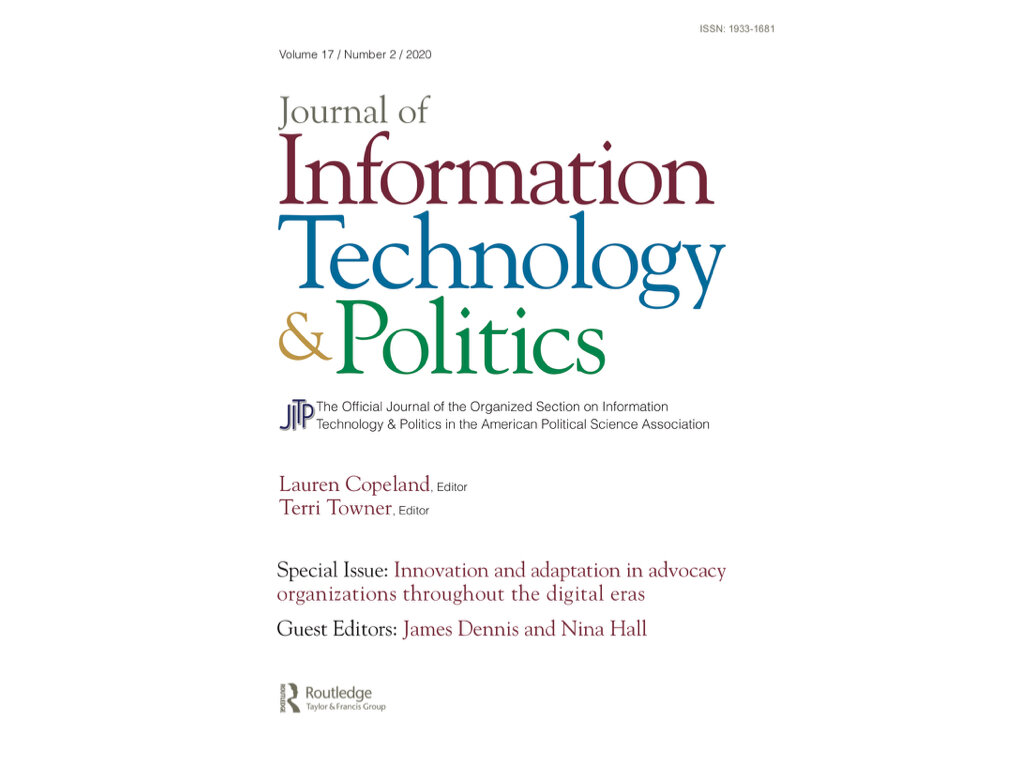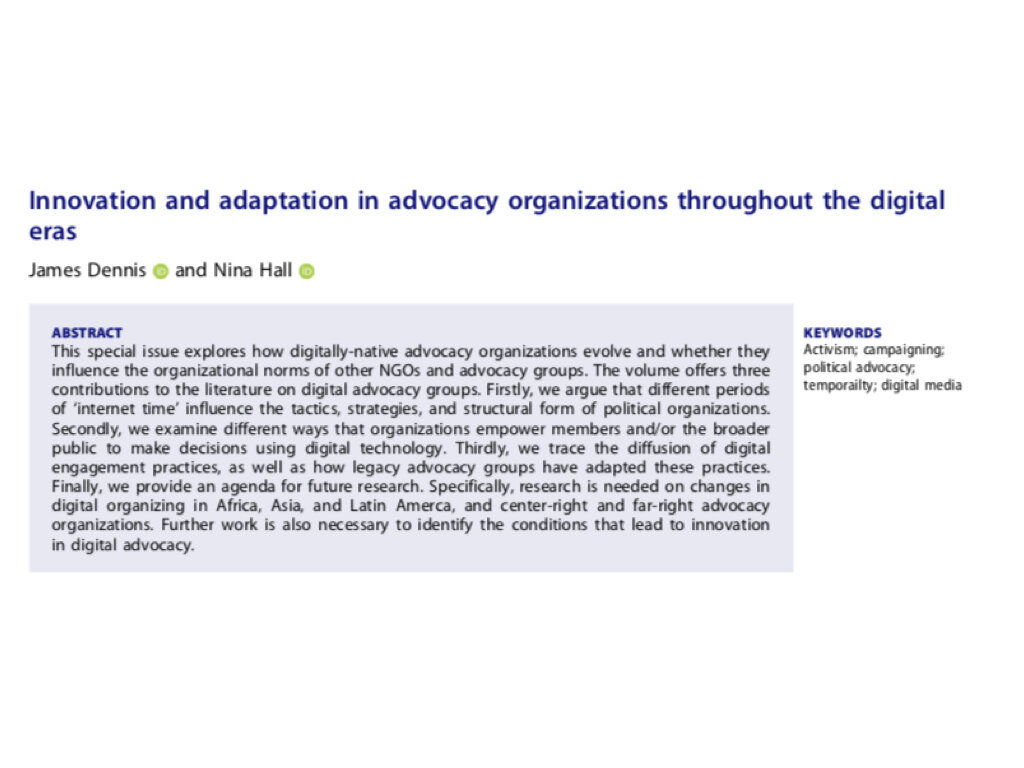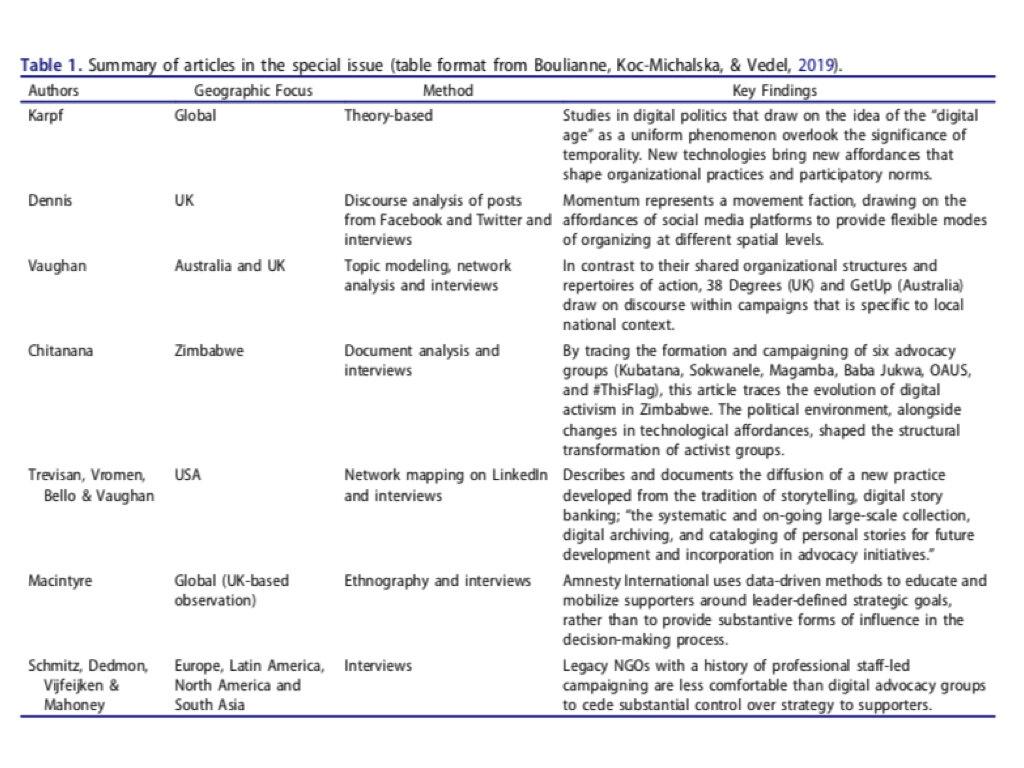Following the Understanding and Examining the Digital Advocacy Pioneers workshop in September 2018, Nina Hall (Johns Hopkins University) and I co-edited a special issue of the Journal of Information Technology and Politics. The articles from the special issue are listed below.
Innovation and adaptation in advocacy organizations throughout the digital eras
James Dennis and Nina Hall
This special issue explores how digitally-native advocacy organizations evolve and whether they influence the organizational norms of other NGOs and advocacy groups. The volume offers three contributions to the literature on digital advocacy groups. Firstly, we argue that different periods of ‘internet time’ influence the tactics, strategies, and structural form of political organizations. Secondly, we examine different ways that organizations empower members and/or the broader public to make decisions using digital technology. Thirdly, we trace the diffusion of digital engagement practices, as well as how legacy advocacy groups have adapted these practices. Finally, we provide an agenda for future research. Specifically, research is needed on changes in digital organizing in Africa, Asia, and Latin America, and center-right and far-right advocacy organizations. Further work is also necessary to identify the conditions that lead to innovation in digital advocacy.
Two provocations for the study of digital politics in time
David Karpf
This article confronts some of the difficulties that temporality poses for the study of digital politics. Where previous articles have discussed the unique methodological challenges for digital politics research – centrally, that we face ceteris paribus problems when attempting to study how people use a medium that is itself still being developed – this article addresses the underlying subject of temporality itself. It offers two distinct provocations. First, it discusses what we are ignoring when we discuss Internet politics in terms of an overarching “digital age” or “digital era.” Conceptualizing a uniform digital age in contraposition to previous media regimes is an easy heuristic crutch, but it comes at the cost of rendering key features of the sociotechnical system invisible. Second, the article distinguishes temporal rhythm from the more common concepts of linear and cyclical time. Particularly in the areas of contentious politics and media politics – areas that are central to the topics covered in this special issue – some of the core changes in institutional processes can be understood as a breakdown of routinized temporal processes. The article then offers suggestions for how digital politics scholars can better incorporate temporal concepts into our research.
Access full article here.
A party within a party posing as a movement? Momentum as a movement faction
James Dennis
This article examines how the UK political organization Momentum uses social media within its campaigning. Drawing on a mixed-method research design, combining interviews with activists in Portsmouth and discourse analysis of content posted on Facebook and Twitter, this article tests whether the leadership provides meaningful influence for members. At the national level, there is little evidence of Momentum fulfilling its “people-powered” vision. Instead, supporters are instructed to undertake tasks at the direction of the leadership. However, this is not a straightforward case of controlled interactivity. The local group in Portsmouth is semi-autonomous, providing member-driven advocacy that is coordinated through a Facebook Group. By using social media to underpin different organizational norms and campaigning tactics at different spatial levels, Momentum represents a “movement faction”.
Talking about tax: the discursive distance between 38 Degrees and GetUp
Michael Vaughan
This paper examines tax justice advocacy (e.g., around multinational corporate tax avoidance) in the UK and Australia between 2010 and 2018 to understand how digital advocacy organizations relate to one another as well as different groups in a shared discursive space. Data from public Facebook pages is analyzed using topic modeling and network analysis, supplemented by interviews with organizational actors. The transnational organizational links between two high-profile digital advocacy organizations – 38 Degrees and GetUp – are not reflected by proximity in the discourse network, which instead displays dominant nationally specific differences around the concepts and corporate targets associated with tax justice advocacy.
Access full article here.
From Kubatana to #ThisFlag: Trajectories of digital activism in Zimbabwe
Tenford Chitanana
Digital communication technologies have been considered as empowering tools for activists advancing socio-political causes or challenging oppression. In Zimbabwe, digital activism is still considerably new, but considered on its own terms, can it offer an insight on digital activism in general? The paper uses six pioneering Zimbabwean groups – Kubatana, Sokwanele, Magamba, Baba Jukwa, Occupy Africa Unity Square, and #ThisFlag, to explore the trajectory of digital activism from the early 2000s to the period immediately after the historic stepping down of the country’s long-time president, Robert Mugabe, in 2017. A qualitative exploration triangulating secondary sources with online research of the groups and in-depth interviews of key actors is used to explore activists’ work. The study’s approach is broadly informed by theoretical concepts from social movements and digital activism literature. While these advocacy groups are separate entities, the study observers that pioneering organizations like Kubatana and Sokwanele have led to Zimbabwe’s non-institutionalized collective action that bridges the online and offline repertoire to make claims and challenge the status quo. A restrictive socio-political environment and the growth in information technologies, and opportunities they present for activists and civil society caught in this repressive context, weave through the 20-year trajectory of Zimbabwean digital activism.
Access full article here.
Mobilizing personal narratives: The rise of digital “story banking” in U.S. grassroots advocacy
Filippo Trevisan, Bryan Bello, Michael Vaughan and Ariadne Vromen
This article interrogates digital “story banking,” a storytelling practice that has become increasingly popular among U.S. grassroots advocacy organizations. Through the examination of LinkedIn data and in-depth interviews with story banking professionals, this technique emerges as the centerpiece of the growing institutionalization, professionalization, and datafication of storytelling in progressive advocacy. Following the 2016 election, political crisis and an increasing awareness of changing information consumption patterns promoted story banking diffusion. Story banking ushers in the era of stories as data and political story on demand. Yet, political constraints currently limit story banking to a reactive approach based on news monitoring, algorithmic shortlisting of stories, and audience testing. Furthermore, an unresolved tension has emerged between the growing centralization of storytelling functions and the participatory potential of crowd-sourced story banks. The implications of these trends for progressive advocacy organizations and the groups they aim to represent are considered.
Access full article here.
Adaption to data-driven practices in civil society organizations: A case study of Amnesty International
Amber Macintyre
Digital membership organizations assert that their innovative use of data-driven practices is at the heart of their people-powered decision-making models. These data-driven practices, and associated values, have become aspirational to other organizations. However, there are growing concerns that data practices reinforce the decision-making power of the data collector at the expense of the rights of the data subject. This research considers how traditional membership organizations adapt to these new data-driven practices, while addressing these concerns. This paper demonstrates how the political communication theory of the trustee, delegate, and responsible leadership models resolves the tension in the discourse surrounding data practices by exploring the positives and negatives of both decentralized decision-making and centralized decision-making. The framework is then explored in practice through an ethnographic case study of Amnesty International. The results show how the use of data to be people-powered is a powerful discourse, but ultimately new data practices are only used to centralize power, as is purported by critical literature.
Access full article here.
Democratizing advocacy?: How digital tools shape international non-governmental activism
Hans Peter Schmitz, J. Michael Dedmon, Tosca Bruno-van Vijfeijken and Jaclyn Mahoney
Legacy advocacy organizations face growing competition from digitally native organizations. Interviews with leaders and staff of both types of organizations reveal that legacy NGOs with professionalized and staff-led advocacy strategies are less comfortable than digital natives to cede substantial control over campaigns to their supporters. At the same time, legacy NGOs and digital natives acknowledge similar challenges with regard to enhancing the civic agency of their supporters. Digital natives are more open to online feedback and supporter-led actions, while both types of organizations report similar challenges in utilizing digital tools for sustained and long-term organizing.
Access full article here.


